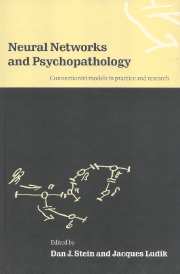Preface
Published online by Cambridge University Press: 12 January 2010
Summary
This volume of essays on neural networks and psychopathology is aimed at an unusually diverse audience. On the one hand, we hope that the volume will be read by psychiatrists, psychologists, and other clinicians and researchers interested in psychopathology and its treatment. On the other hand, we hope that it will be read by those who work in the fields of cognitive science and artificial intelligence, and particularly those interested in neural network or connectionist models.
We believe that it is timely for clinicians and computational modellers to be in closer contact.While recent decades have seen dramatic advances in pharmacological and psychological treatments of psychiatric disorders, clinical science often lacks an adequate theoretical framework for integrating neurobiological and psychological data. Conversely, while neural networks have been tremendously successful in modelling a range of important psychological phenomena and in analysing data from a wide range of other sciences, less work has focused on connectionist models of psychopathology.
Neural network models of psychopathology have immediate theoretical and empirical appeal. They are theoretically interesting because they seem to incorporate neurobiological and psychological data in a seamless model of the way in which representational processes emerge from assemblies of neuron-like processing elements. They are empirically useful because they have been able to allow rigorous and elegant simulations of such uniquely human phenomena as pattern recognition, categorization, and learning; simulations that have in turn led to new insights into the phenomena under study.
Information
- Type
- Chapter
- Information
- Neural Networks and PsychopathologyConnectionist Models in Practice and Research, pp. xi - xivPublisher: Cambridge University PressPrint publication year: 1998
